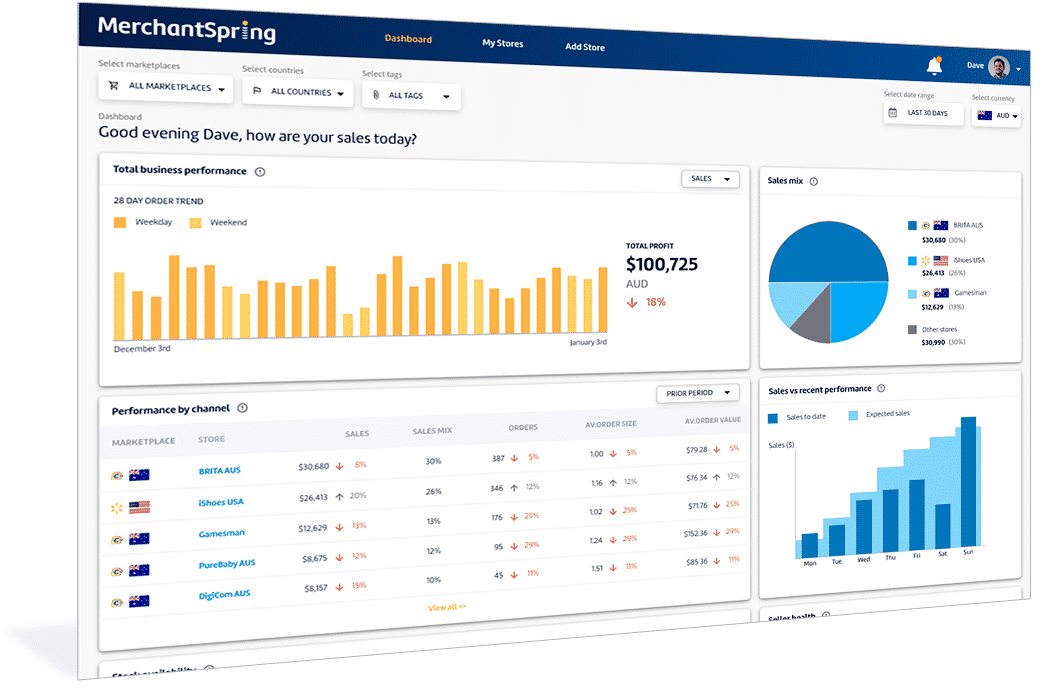3 Tools Every Marketplace Seller Will Use in 2025
Overview
The global eCommerce landscape is undergoing a structural evolution. Marketplaces like Amazon, Walmart, eBay, and emerging regional players are driving growth at a scale traditional retail hasn’t seen in decades. Yet, with expansion comes complexity. Sellers are managing fragmented operations, increasingly algorithmic platforms, and ever-demanding customers. In 2025, the most successful marketplace sellers will be defined not by the size of their catalog, but by their tech stack.
Here are three tools that will be foundational for every high-performing marketplace operator.
1. Multi-Marketplace Performance Dashboards
Gone are the days of logging into 10 different seller portals. Sellers are demanding a single view of performance across all marketplaces — Amazon, Walmart, eBay, Target, and beyond.
Why It Matters in 2025: With cross-border commerce booming and sellers increasingly adopting omnichannel strategies, centralised oversight is no longer a nice-to-have—it’s essential. Tools like MerchantSpring are leading this category by offering:
- Unified KPIs across marketplaces (sales, traffic, Buy Box, conversion)
- ASIN/SKU-level granularity
- Automated alerts for underperforming products or categories
- Multi-account roll-up reporting for aggregators and agencies
Market Insight: While public adoption data on AI listing optimization tools is still emerging, the broader eCommerce environment highlights why these technologies are essential — especially when combined with performance insights.
According to Artios, global eCommerce sales reached $6.3 trillion in 2023, with forecasts projecting more than $7.5 trillion by 2025. This explosive growth is increasing competition across every major marketplace, from Amazon and Walmart to eBay and Target Plus.
But here's the problem:
Even with tools like Helium 10, Jungle Scout, or in-house AI listing generators, sellers often lack the ability to measure the real-world impact of their listing changes across multiple marketplaces.
That’s where MerchantSpring fits in.
By providing:
- Marketplace-wide performance dashboards
- ASIN-level sales and traffic trends
- Real-time visibility across multiple countries and platforms
...MerchantSpring allows agencies and enterprise sellers to validate which listings are working and where optimization efforts are falling flat.
Optimization without measurement is guesswork.
AI tools may write your listings — but MerchantSpring shows you what’s actually converting.
With sellers expanding to 5–10+ marketplaces, consolidating data into one dashboard isn’t just a luxury — it’s a survival tactic.
2. AI-Powered Listing Optimization Tools
In today’s marketplace landscape, visibility equals revenue — and visibility is driven by highly optimized, algorithm-friendly listings. That’s why AI-powered listing optimization tools have shifted from “nice to have” to critical infrastructure for both brand owners and agencies.
According to McKinsey’s 2024 report on generative AI in retail, generative AI has the potential to boost productivity in marketing-related tasks by up to 30%, particularly in areas like product content creation and keyword optimization. For marketplace sellers, this translates directly into faster listing iterations, smarter SEO strategies, and more scalable catalog management.
What top sellers and agencies are using:
AI-driven tools like Helium 10, SmartScout, DataHawk, and ZonGuru are helping eCommerce teams:
- Analyze and optimize titles, bullet points, descriptions, and backend keywords with performance-based recommendations.
- Benchmark listings against top competitors on a marketplace-by-marketplace basis.
- Deliver real-time listing quality scores based on customer search trends and Buy Box performance.
Many platforms now use machine learning to interpret changes in search trends and automatically update or recommend listing revisions — saving time while keeping content competitive.
How MerchantSpring Adds Value Here:
While these AI tools are powerful, they are often used in isolation — which means sellers are left guessing about their impact across marketplaces.
MerchantSpring closes that loop by giving you:
- Cross-marketplace ASIN-level insights
- Visibility into the performance before and after listing updates
- Tracking for conversion rate, traffic, and organic rankings
…MerchantSpring becomes the validation layer for your listing optimization tools. You can track whether your Helium 10 revisions to a SKU on Amazon US also lifted performance in Amazon UK — or had no effect at all.
Why it matters:
AI tools help you optimize listings. MerchantSpring helps you prove it worked.
3. Automated Reporting Platforms for Agencies and Aggregators
As agencies scale and manage dozens — even hundreds — of marketplace accounts, manual reporting becomes a critical bottleneck. Copy-pasting from seller portals, aggregating spreadsheets, and building slide decks not only drains time, but also increases the risk of inconsistency and data errors.
In today’s competitive environment, agencies need to differentiate through operational excellence — and that starts with client-facing reporting.
What Modern Agencies Demand:
Leading marketplace agencies are investing in automated reporting platforms that enable:
- Client-Specific Dashboards
Custom views by brand, region, or platform — no more generic reporting. - Scheduled Performance Reports
Auto-generated weekly/monthly reports delivered to clients, reducing overhead and improving consistency. - White-Label Portals
Fully branded dashboards and reports that reinforce the agency’s value — not a third party’s.
Market Insights:
According to Shopify's 2024 global commerce trends, eCommerce sales will exceed $6 trillion this year, and agencies are being increasingly asked to justify spend, ROI, and growth strategies with real-time transparency. Automation isn’t just a time-saver — it’s a client retention strategy.
Why MerchantSpring is the Platform of Choice:
MerchantSpring Marketplace Manager is purpose-built for multi-client operations:
- Centralized reporting across Amazon, Walmart, eBay, Target, and more
- Custom dashboards for each client or portfolio
- Scheduled exports and auto-sharing
- White-labeled branding for a seamless agency experience
Agencies using MerchantSpring report up to 80% reductions in time spent on reporting, freeing up strategic resources to focus on performance — not data wrangling.
Why it matters:
Automated reporting doesn’t just eliminate busywork — it becomes a scalable client experience engine.
Final Takeaway:
The most competitive marketplace teams in 2025 will be defined by three things:
Visibility, scalability, and accountability.
Investing in multi-marketplace dashboards, AI-driven optimization, and automated reporting gives sellers and agencies the edge they need to stay ahead — and stay profitable.
📘 Want to see how leading agencies are scaling smarter?
→ Book a demo with MerchantSpring










Add a Comment